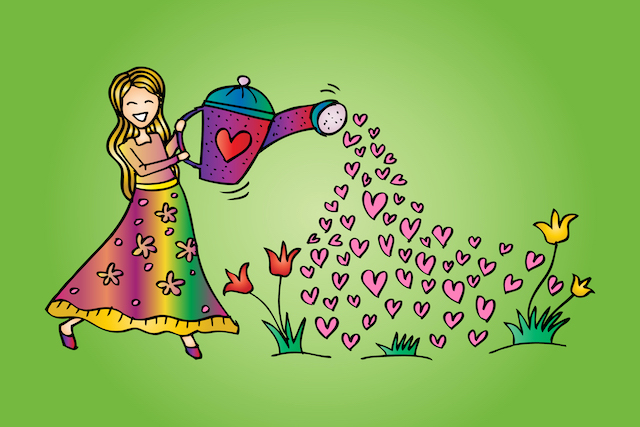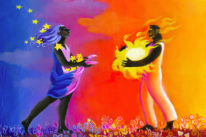
“Respond kindly to someone who is unkind to you.” ~Lori Deschene (from Tiny Buddha’s 365 Tiny Love Challenges, January 15)
Growing up with an alcoholic father, I was often on the receiving end of his anger. As a child, I didn’t realize his behavior was a reflection of how he felt inside and wasn’t about me at all.
I thought he was angry because I wasn’t good enough or I had done something wrong. I felt like if I could just be perfect enough, maybe he would love me. I tried and tried, but trying to be perfect didn’t work.
As I got older, I learned to react to everyone around me. If someone was rude, I was rude back. If someone yelled at me, I yelled back. This harmed my relationships and caused a lot of isolation in my life.
I wanted to be alone because I felt like everyone hurt me. But, I discovered, that is not the answer.
It’s taken me years to realize that I’m responsible for my own behavior and can’t control others. I now focus on behaving with kindness to everyone and my relationships have improved as a result.
It’s not always easy, but the following tools have helped.
If someone triggers fear and anxiety, don’t respond until you are calm.
Reacting to what someone is saying rather than responding from a place of calm rarely goes well. I’ve learned that I don’t have to answer every question. I can say, “I don’t want to talk about that right now,” and come back later in a better frame of mind.
When another person projects their fear onto you, it’s okay to walk away.
I came to the realization that I was walking into my parents’ house in a state of agitation and defensiveness; I was adding my anger and anxiety to the negative energy in the house.
An amazing thing happened when I stopped walking in the door that way; it seemed to positively affect everyone’s energy. There is a sense of peace in our interactions that wasn’t there before.
Now, when I walk into any situation at work or with family, I check my attitude when I walk in the door. Often, that makes a big difference.
When you don’t add your fuel to the fire, sometimes the fire goes out.
Don’t make up stories about the motivations of others.
I’ve come to understand that a lot of the things I think in my head aren’t true.
If a friend calls and cancels, I tell myself it’s because she doesn’t want to hang out with me. If my husband is in a bad mood, I tell myself it’s because he’s unhappy with me.
I don’t know any of those things. They are only stories in my head. These stories create defensiveness in me, which creates conflict where none exists.
There are a million reasons people might cancel plans or be in a bad mood. Most of the time, it has nothing to do with you.
You can’t make another person happy or unhappy. Another person cannot make you happy or unhappy. A person’s happiness comes from their own thoughts and behavior, not what someone else is doing.
The next time someone does something and you assume you know why, question whether you really know if that’s true.
Try love first.
Most people are doing the best they can from their level of consciousness. We are all in this together and at our core, we are basically good.
Hatred and anger cannot wipe out hatred and anger. But sometimes love and understanding can.
I was always waiting for an apology or a change in behavior from the other person. Sometimes it has to begin with you. Sometimes, you have to accept the fact that the other person may never change.
What is hurting you most is your behavior toward them. Changing that will help you feel better.
Resentment will poison you from the inside. Forgive the other person for yourself. Let the anger go.
Amazingly, sometimes that also changes the other person. But you have to go first.
Love is worth a try. Give it a shot.
Set boundaries when needed.
Part of learning to love yourself is learning to listen to your gut and speak your truth.
If someone is being unkind to you, say something.
Don’t let others treat you poorly. Treat yourself with love and compassion.
Don’t blame, criticize, or complain. Calmly state your boundaries.
Sometimes, relationships don’t work out. Sometimes, you need stronger boundaries.
But changing your behavior instead of waiting for the world to change gives you back your personal power.
Come from kindness and watch your world change.
About Melissa McCaughan
Melissa McCaughan, the author of Legacy, is a literal ghost writer, choosing ghosts as the protagonists of her novels. She is currently working on a sequel, Epiphany, coming out later this year. She teaches an Adventure e-course called There’s No Place Like Home: Finding Adventure in Your Own Backyard and writes a blog called Carpe Diem. Follow her on Facebook.













 Though I run this site, it is not mine. It's ours. It's not about me. It's about us. Your stories and your wisdom are just as meaningful as mine.
Though I run this site, it is not mine. It's ours. It's not about me. It's about us. Your stories and your wisdom are just as meaningful as mine. 